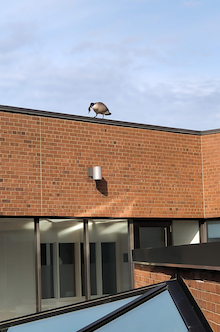The Daily Bulletin is published by Internal and Leadership Communications, part of University Communications
Contact us at bulletin@uwaterloo.ca
Submission guidelines
Editor:
Brandon Sweet
University Communications
bulletin@uwaterloo.ca
Vice-President, Research and International Charmaine Dean has circulated a memo to employees and graduate students on how laboratory operations should be handled in light of the modifications made to University services. The key messages of that memo are as follows:
"Yesterday we heard from Prime Minister Justin Trudeau about the importance of taking every possible measure to help reduce the spread of COVID-19," Dean writes. "The University is continuing to take steps to safeguard our people, enable employees to work from home through the delivery of alternative and online services and maintain critical on-campus functions."
"We are asking that researchers only maintain research on-campus if it is deemed critical research, until further notice. Critical research includes lab activities, that if disrupted, would result in serious loss of research data, material or equipment."
"Due to the rapidly changing situation, it is paramount that researchers take the necessary steps to delay or suspend research activities that rely on physical campus resources or buildings. We need to think about what on-campus research needs to proceed and ensure the safety of our research staff and students."
"To be clear – unless critical to your research, you must make every effort to limit the research activity happening on campus. Research activity that can be done from home can continue. And you must prepare, even if your on-campus research is deemed critical, to close down on campus research activities at short notice."
"We have a responsibility at this time to take measures that can help to slow the spread of the virus and protect more vulnerable populations that are at increased risk of more severe outcomes," the vice-president writes.
The University’s COVID-19 website is being kept up to date with important information.
The Waterloo Undergraduate Student Association (WUSA) is working to keep students informed of the latest developments of the ongoing COVID-19 situation. WUSA has created a COVID-19 page that contains the latest updates/info for students.
WUSA's offices and business operations in the Student Life Centre are closed, as well as all student society-related businesses including CNDs.
"The Food Bank is looking for specific donations to help support our students during these difficult times," says a note fro WUSA. If you are able, please consider donating the following:
"Please drop these items off in the SLC basement, across from the CIBC, as we cannot pick up from our regular donation locations during the next few weeks," says a note from WUSA. "Hampers are available at Turnkey for those in need."

This is an excerpt of an article originally published in Waterloo Stories as part of an ongoing Global Impact series.
Each day across Canada, police officers respond to emergency calls in which mental health is a key concern. This can result in complex, potentially volatile situations where an officer’s ability to respond effectively is crucial. “Providing accurate information can go a long way to providing better care for the individuals involved, so everyone understands the situation in the same terms,” says Daniel Pearson Hirdes, a Waterloo alumnus and co-founder of HealthIM. His platform is being used in 21 police services and RCMP detachments in Ontario, Manitoba and Saskatchewan to inform on-scene decision-making and connecting those in need to appropriate support services.

The geese shall inherit the earth: birds are goose-stepping around Needles Hall as they consolidate their power.
UW Police Services have begun locking down the tunnels and bridges that connect University buildings and will be closing certain buildings in an orderly fashion in an effort to allow Plant Operations to deploy essential resources in an efficient fashion. Most buildings on campus remain open and accessible via their exterior entrances.
StudentCare's office in the Student Life Centre has closed until further notice.
The planned March drop-off dates for the "Duds for Studs" initiative, which was seeking gently used suits, formal wear, dress pants and shirts for students who otherwise couldn't afford them during prom and graduation season, have been cancelled. The initiative is organized by Chin Heng Lee of the Institute for Quantum Computing.

Creative Work-From-Home setups
Please note: The University has suspended all events that are not considered vital to its academic mission. Please contact the event organizers to confirm that the specific event has been cancelled or postponed, or if the event has shifted to an online mode of delivery.
If you have listed an event with the Daily Bulletin and need to cancel, postpone or modify the listing, please send an email to bulletin@uwaterloo.ca.
If you have an upcoming event that has not yet appeared in the When and Where listing, please send an email to bulletin@uwaterloo.ca to confirm the event's status.
NEW - Working Remotely with Teams (Live Webinar), Friday March 20, 10:00 a.m. to 12:00 p.m.
Waterloo Centre for German Studies Grimm Lecture 2020, “Thinking Itself is Dangerous: Reading Hannah Arendt Now,” Thursday, March 19, 7:00 p.m. Please note: this event will be livestreamed - watch via Facebook. Watch via YouTube.
Concept by Velocity - Graduate Student Startup Fund applications close, “Apply for the chance to win up to $20,000 and take your research to the next level,” Friday, March 20.
Research Ethics drop-in session for faculty and students, Wednesday, March 25, 10:00 a.m. to 12:00 p.m., Dana Porter Library (study booth on the main floor). Please note: this event has been cancelled.
Documenting Your Teaching for Tenure and Promotion, Wednesday, March 25, 11:45 a.m. to 1:15 p.m., E7 7363. Please note: this event will be delivered as an online webinar.
Akindi Live Training (Webinar), Wednesday March 25, 2:00 p.m. to 3:00 p.m. - Register on GoSignMeUp.
Research Ethics drop-in session for faculty and students, Wednesday, April 1, 10:00 a.m. to 12:00 p.m., Dana Porter Library (study booth on the main floor). Please note: this event has been cancelled.
Faculty Association Spring General Meeting, Tuesday, April 7, 12:00 p.m. Note: this event will take place online.
Research Ethics drop-in session for faculty and students, Wednesday, April 8, 10:00 a.m. to 12:00 p.m., Dana Porter Library (study booth on the main floor). Please note: this event has been cancelled.
Here's the latest Nutrition Month "myth vs. fact" supplied by Health Services Dietitian Sandra Ace:
Myth:
Gluten-digesting pills can break down gluten
Fact:
I must admit I didn’t realize these were a “thing” until a student with whom I recently met informed me they were using them. When I researched this further, I found a variety of gluten “digesters,” “blockers” or “cutters” that can be purchased in retail locations and online. These supplements are promoted as containing enzymes that target and break down gluten so “you don’t have to avoid the foods you love.”
For an expert opinion, I didn’t need to go any farther than my office bookshelf. Shelley Case is a Canadian dietitian who is a widely respected international authority on gluten-free diets. In her book, Gluten Free - The Definitive Resource Guide, Case states that commercial enzyme supplements that claim to digest gluten “are NOT effective and should NOT be used by those with celiac disease.” While I couldn’t find any commentary on the Canadian Celiac Association website, the Center for Science in the Public Interest published a recent article, “Do ‘gluten-digesting’ pills work?” that also reports these supplements do not protect people with celiac disease from the damaging effects of gluten.
There is no current enzyme or supplemental product that can digest gluten in the stomach before it enters the small intestine. While most people will not have problems digesting gluten-containing foods, any one with celiac disease can not have gluten in any form for the rest of their life – or as least not at this point in time. Supplements like this provide false assurances that are not based in science and should not be used.
The Daily Bulletin is published by Internal and Leadership Communications, part of University Communications
Contact us at bulletin@uwaterloo.ca
Submission guidelines
The University of Waterloo acknowledges that much of our work takes place on the traditional territory of the Neutral, Anishinaabeg, and Haudenosaunee peoples. Our main campus is situated on the Haldimand Tract, the land granted to the Six Nations that includes six miles on each side of the Grand River. Our active work toward reconciliation takes place across our campuses through research, learning, teaching, and community building, and is co-ordinated within the Office of Indigenous Relations.